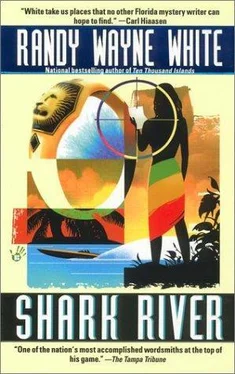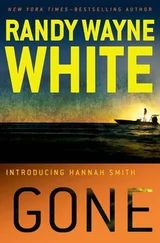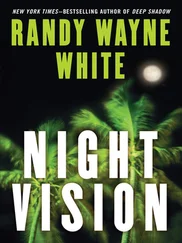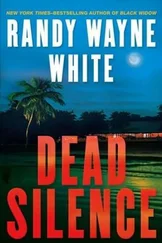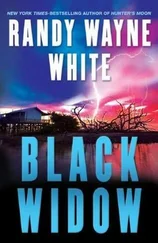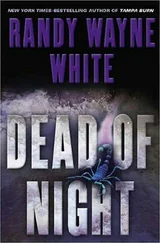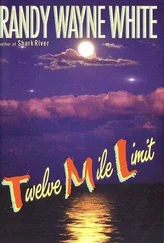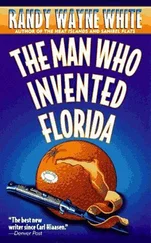Randy White - Shark River
Здесь есть возможность читать онлайн «Randy White - Shark River» весь текст электронной книги совершенно бесплатно (целиком полную версию без сокращений). В некоторых случаях можно слушать аудио, скачать через торрент в формате fb2 и присутствует краткое содержание. Жанр: Триллер, на английском языке. Описание произведения, (предисловие) а так же отзывы посетителей доступны на портале библиотеки ЛибКат.
- Название:Shark River
- Автор:
- Жанр:
- Год:неизвестен
- ISBN:нет данных
- Рейтинг книги:3 / 5. Голосов: 1
-
Избранное:Добавить в избранное
- Отзывы:
-
Ваша оценка:
- 60
- 1
- 2
- 3
- 4
- 5
Shark River: краткое содержание, описание и аннотация
Предлагаем к чтению аннотацию, описание, краткое содержание или предисловие (зависит от того, что написал сам автор книги «Shark River»). Если вы не нашли необходимую информацию о книге — напишите в комментариях, мы постараемся отыскать её.
Shark River — читать онлайн бесплатно полную книгу (весь текст) целиком
Ниже представлен текст книги, разбитый по страницам. Система сохранения места последней прочитанной страницы, позволяет с удобством читать онлайн бесплатно книгу «Shark River», без необходимости каждый раз заново искать на чём Вы остановились. Поставьте закладку, и сможете в любой момент перейти на страницу, на которой закончили чтение.
Интервал:
Закладка:
Now he was furious. Tomlinson and Ransom were out of sight, and there was a real possibility I’d just ruined his surveillance. Some idiotic tourist in a little white car. He laid on the horn, shot me his middle finger, and swerved out to pass again.
We were on a long section of straightaway. The road had been built with fill dug by a floating dredge-typical of roads in the Everglades. There was a canal running along the eastern edge of the road, sawgrass and cypress domes beyond.
When he swerved, I swerved with him, forcing him off onto the shoulder, then accelerated, driving down the middle of the road so he couldn’t pass again. I watched him charge up hard once more, until we were bumper to bumper, his expression contorted… and then I saw him lean and come up with something in his right hand.
A handgun.
That’s what I was waiting for. I put as much distance as I could between our two cars. I was doing close to eighty and about three car lengths ahead of him when I mashed the Toyota’s emergency brake to the floor. I felt the wheels lock, rubber screaming, and I turned the steering wheel a gentle quarter revolution to the right, which effectively pivoted the car 180 degrees-a “boot turn” in the language of combat drivers, taken from the days when bootleggers had to outrun the feds.
The driver of the Taurus did the only thing he possibly could to avoid hitting me-yanked the wheel of his car instinctively to the left, and I saw just the flash of his rear window and bumper as he went bouncing off the road and airborne through the guard rail, then into the canal, plowing a ton of water.
I stopped and backed until I was even with the Ford. It was floating trunk-high. I got out, using my car as a shield, then braced my right arm on the roof, the Sig Sauer pointed at the driver as he climbed out through the window.
He was shaken, his color not good. In Spanish, I yelled, “Show me your hands! Palms out!” Then: “Swim to this side. Now!”
He came climbing out on the bank with a water spaniel meekness. He was bigger than I’d expected. Younger, too. He had his hands over his head, trying not to slip in his soaked pants and leather shoes; he shook his head at me when I yelled, “Who sent you? Cordero?” thinking that if Cordero had sent him, I should shoot him, shoot him dead and leave him… then wondered if I could. Did I still have that dark and clinical little place in me that facilitated such extreme behavior?
But the man surprised me by saying in English, “No. Not Cordero. I don’t know who hired me. I swear!” Then his expression became perplexed. “Wait, you’re… you’re him. The man I was supposed to be following. How… how… why aren’t you in the truck?”
“I am. You’re just having a bad dream, that’s all.”
“I didn’t even see you back there.”
“That’s what you can expect to see when I’m tailing you.”
His voice was shaking now. “I don’t get it!”
“You’re about to. In the kneecap. Every time you refuse to answer a question, bang, I shoot you in the kneecap. First question: Why the hell are you following me?”
He reached for his back pocket, and I leaned toward him, weapon extended, glancing quickly to the left and right: no cars coming.
“ Don’t. Don’t shoot me. Please. What they told me was, if I somehow screwed up, if you figured out what I was doing, I’m supposed to give you this.” He had his billfold out, and was taking a white note card from it.
“Who’s they? Who’re you working for?”
“My name’s Romano.”
“That’s not what I asked.”
“Okay, okay. I’m a private investigator from Lauderdale. Sometimes I do contractual work. For the government, for corporations, I’m not even sure who it was who hired me. It was all set up by phone. Here, maybe this will explain. I don’t even know what it says.”
I took the paper and saw that it was an envelope. I opened the envelope and read: Doctor Ford, In the event that you realize you’re under surveillance and turn the tables, please don’t hurt Mr. Romano or his coworkers. They are not in your league. I’ve hired him to provide me with information and to protect you if necessary. Friend or foe-remember that exercise?
The typewritten note was signed HH.
Friend or foe referred to a common instructional exercise used by state department and Secret Service types. On any important security assignment, where one or more people may be targeted for assassination, friendly surveillance is assigned without the knowledge of the potential target. It may unknowingly be assigned by more than one agency, so the trick is to figure out who the good guys are and who the killers are.
I said to Romano, “So tell me what you’ve seen. Have you noticed any other people watching me? Following me?”
He nodded his head, eager to please. “Yesterday, for sure. Three men in a white Chrysler that was rented out of Miami International. I checked it out.”
“I was on the water most of the day yesterday.”
“I know. I saw them watching you through binoculars.”
“White or black? What color were they?”
“Two white, one a very light-colored black.”
I crumpled the note and stuck it in my pocket. Touched the auto-uncock lever of the Sig, turned and walked back toward my rental.
“You’re not going to go off and leave me, are you? My cell phone’s in there ruined, my billfold, all my clothes. What’m I going to do about my car?”
I said, “You’re asking my advice? Okay. Get in there and start bailing. And watch out for gators. You’re entering the food chain, pal, and not exactly on the top rung.”
I got back in my little white Toyota and drove away.
18
Tomlinson said, “I thought you had to work in the lab, now here you are driving a rental car. You have some weird little crevices in that brain of yours, my friend. You make some odd behavioral choices.” Then: “The old town’s changed, hasn’t it?”
Yep. Mango, what was left of the original, had certainly changed. Mango had once been a tiny clearing in a massive plain of marl and swamp. It was a collection of houses and docks on a weak curvature of mud flat that created a harbor, and the harbor curved away toward the charcoal gloom of Ten Thousand Islands, mangrove keys all in a maze, joined by water and shadow. They separated Florida’s mainland from the Gulf of Mexico. Florida Bay was to the south, Key West seventy miles beyond, and nothing, neither house nor road, between.
Before these obvious changes, it wasn’t a town, really. Not even a village. Mango used to be what was once known as a fish camp. It was a mangrove outpost: a row of peeling houses with rusted tin roofs built haphazardly, their impermanence uncontested, as if it were just a matter of time before a hurricane came and swept them away, or until roots and vines grew up through the floors, out the windows, and covered them.
Drive the winding mudflat road through seven or eight miles of swamp where the tide comes right up and floods across, then around a curve beneath coconut palms. Mango Bay rises out of the mangroves to the right. The village is on the left: streetlamps and houses on a low ridge of Indian mounds that face the water. The houses sit on squat pilings, the shell road separating them from the bay. There were also five houses built in the shallows, joined by individual boardwalks leading to the shore. They reminded me of my place on Sanibel.
Tucker had owned all those stilthouses at one time-fish shacks, he called them, but they were in much better shape now. In fact, all of Mango looked to be in better shape… modernized, anyway. The houses had been rebuilt, remodeled, repaired, and all of them had been painted or sided with aluminum, in Caribbean pastel colors, conch pink and coral and blue. Even the little store had been reopened, Homer’s Sundries-only now it was a Circle K with a big plastic sign, cars parked in the shell lot, cars moving up and down the street. There looked to be a half-dozen new duplexes, too, all waterfront; a lot of money was being invested, with more being built down the shoreline, judging from the crane and cement trucks, all the construction noise in the distance. A busy place. Modern Florida had finally found Mango.
Читать дальшеИнтервал:
Закладка:
Похожие книги на «Shark River»
Представляем Вашему вниманию похожие книги на «Shark River» списком для выбора. Мы отобрали схожую по названию и смыслу литературу в надежде предоставить читателям больше вариантов отыскать новые, интересные, ещё непрочитанные произведения.
Обсуждение, отзывы о книге «Shark River» и просто собственные мнения читателей. Оставьте ваши комментарии, напишите, что Вы думаете о произведении, его смысле или главных героях. Укажите что конкретно понравилось, а что нет, и почему Вы так считаете.
